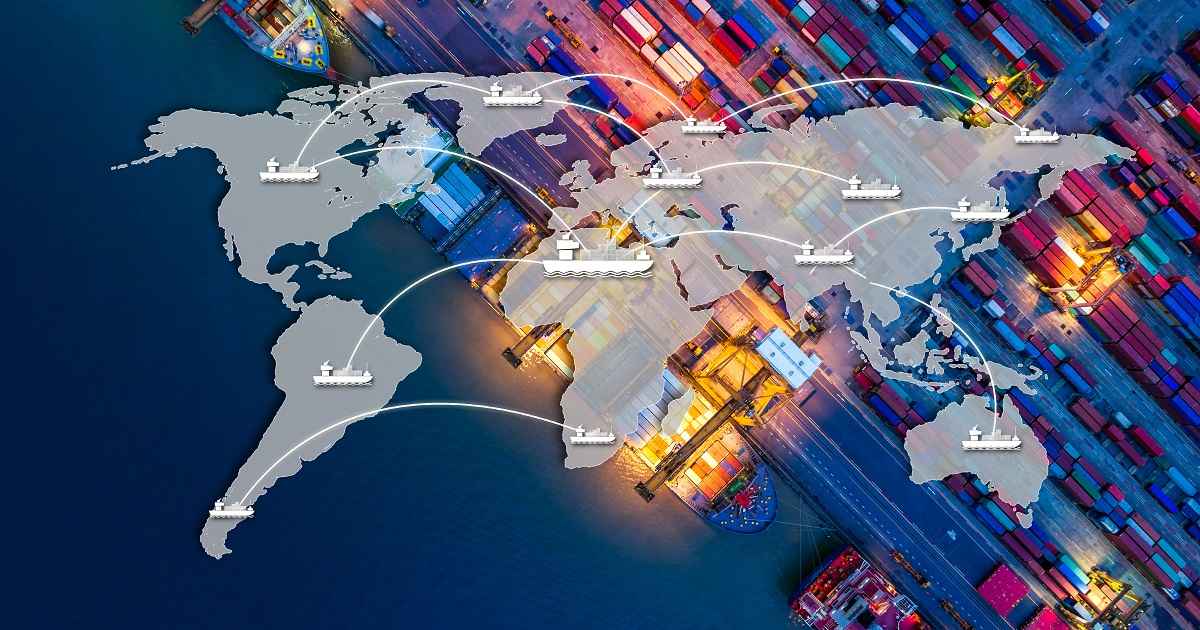
Warehousing and Distribution
Article | July 11, 2023
Explore the techniques to improve warehousing and distribution centre. Learn from the best books of logistics and distribution management and enhance warehousing operations and distribution processes.
Efficient warehouse management is crucial in the complex world of distribution and logistics. With various warehouse types serving different purposes, warehouse managers are responsible for ensuring smooth operations, safeguarding valuable goods, and optimizing supply chain units. Building a strong knowledge base is key, and the best way to start is by delving into the top warehouse management books. This article presents a curated list of essential reads that will provide you with a solid foundation in the warehouse and distribution field. From understanding fundamentals to exploring cutting-edge practices, these books help in better decision-making regarding warehousing and distribution operations.
1. Fundamentals of Warehousing & Distribution
Author Name: Material Handling Industry
Fundamentals of Warehousing & Distribution is an essential book for professionals in the warehousing and distribution industry. Published as part of the MHI Career & Technical Education Program, this series of four warehouse management books provides comprehensive knowledge on material handling equipment, information technology tools, and warehouse operations. Volume 1 serves as a foundational guide, introducing readers to modern warehouses and distribution centers' equipment, processes, and operations. With its focus on practical knowledge and industry best practices, this warehouse and distribution book provides readers with the skills and expertise necessary for successful warehouse and distribution management.
2. Warehousing and Distribution Practices
Author Name: xu ji ying
Divided into two parts, Warehousing and Distribution Practices covers seven key areas of the real-world processes for managing storage and implementation of effective distribution strategies. This distribution management book focus on essential knowledge and skills, each section provides valuable insights through logistics standard terms, case studies, knowledge links, and practical application. As one of the best books on logistics and distribution management, it will give you the complete step-by-step guidance to expand and improve warehousing and distribution centre by leveraging the theory shared by xu ji ying.
3. Warehousing And Distribution Management Project Type Tutorial
Author Name: Wang Yu
Warehousing and Distribution Management Project Type Tutorial, a logistics and supply chain management book, revolutionize logistics education with its innovative approach. This comprehensive book goes beyond traditional teaching methods, immersing readers in real-world scenarios and practical projects. Through eleven immersive teaching projects and thirty-two dynamic learning tasks, readers gain hands-on experience in system planning, business management, quality control, inventory operations, technology application, and more. Developed in collaboration with industry experts, this tutorial bridges the gap between theory and practice, empowering logistics professionals to navigate the complexities of warehouse and distribution management. With its unique project-based structure, this warehousing and distribution book delivers a transformative learning experience for aspiring logistics and supply chain industry leaders.
4. Fundamentals of Warehousing & Distribution: Volume 3
Author Name: MHI
Fundamentals of Warehousing & Distribution, a logistics and supply chain management book revolutionizes how logistics professionals perceive warehouses. By delving into captivating case study examples, this book unveils the intricacies of different warehouse configurations, showcasing how cutting-edge equipment and technologies empower diverse order fulfilment strategies. It challenges conventional wisdom by emphasizing that warehouses are no longer mere storage spaces; they have transformed into dynamic hubs that efficiently cater to a wide range of order types, from bulk shipments to individual products. With its ground-breaking insights and practical applications, this volume is a game-changer for industry experts seeking to elevate their warehousing and distribution management skills.
5. Warehouse Distribution and Operations Handbook
Author Name: David Mulcahy
Optimize warehouse operations with this warehouse and distribution management book, Warehouse Distribution and Operations Handbook. With a focus on improving inventory management, reducing costs and enhancing customer experiences, this handbook offers best practices, methods, equipment applications and technologies to utilize in different warehouse and distribution centres. Whether it's industrial, mail-order, or retail facilities, this comprehensive logistics and distribution management book provides the knowledge and strategies to drive profitability and control assets. It is an essential resource for anyone in the logistics industry looking to master distribution management and excel in warehouse operations.
6. Warehouse and Distribution Centre
Author and Editor Name: Robert Mulder & Michiel Kobussen
The warehouse and Distribution Centre is a valuable resource for logistics professionals and architects navigating the evolving landscape of warehouse design. This distribution management book addresses designers' pressing challenges, including cost control, technical requirements, and safety considerations. It offers a comprehensive system of theories, guidelines, and design standards, accompanied by a diverse collection of global warehouse and distribution centre projects. Balancing both the ends of practical reference and inspirational examples, this best book for distribution management equips readers with the knowledge and insights needed to create efficient, innovative, and sustainable warehouse and distribution solutions. It is a must-read for anyone involved in warehousing and distribution management.
7. Warehousing and Distribution Operation Practice
Author Name: peng jian cheng
Rooted in practical vocational education, Warehousing and Distribution Operation Practice is a book that emphasizes integrating theoretical knowledge with functional operations. It provides a hands-on approach to learning, enabling readers to apply their knowledge directly in real-world scenarios. This warehousing and distribution book will give you the required skills and expertise to optimize operational efficiency. With the help of practices shared by peng jian in the warehouse management book, readers will get insights into supply chain management and logistics operations. In addition, it will not only help in improving the processes in the warehouse and distribution but also enhance the overall business.
8. Operations and Supply Chain Management Essentials You Always Wanted to Know
Author Name: Vibrant Publishers & Ashley McDonough
Overcome the complexities of supply chain management and warehouse operations with Operations and Supply Chain Management Essentials You Always Wanted to Know. This engaging book takes you on a captivating journey through the interconnected world of logistics, unveiling the significance of every step in the process. Through a compelling narrative centred around a fictional company and its consumer product, you'll explore the challenges, decisions, and adaptations supply chain professionals face. Gain a deep understanding of supply chain operations, from disruptive forces to practical applications, and discover the importance of interactive business domains.
9. Start your Own Wholesale Distribution Business
Author Name: The Staff of Entrepreneur Media & Christopher Matthew Spencer
Embark on a lucrative journey in the distribution industry with 'Start Your Own Wholesale Distribution Business.' This comprehensive guide, crafted by the experts at Entrepreneur Media, equips you with the essential steps to establish a thriving wholesale operation from the comfort of your home. Discover the art of being an intermediary, connecting manufacturers and retailers to reap profits. Uncover industry-specific strategies, secure funding, identify profitable niches, forge valuable partnerships, and effectively market your business. With insights from experienced wholesale distributors, sample forms, checklists, and worksheets, this warehousing and distribution book is your roadmap to mastering the world of distribution and logistics.
10. Warehouse Management: The Definitive Guide to Improving Efficiency and Minimizing Costs in the Morden Warehouse
Author Name: Gwynne Richards
Discover one of the best books for logistics management in the modern era with 'Warehouse Management: The Definitive Guide to Improving Efficiency and Minimizing Costs in the Modern Warehouse.' This extensively updated fourth edition delves into the latest technologies, such as robotics, cobots, and AI, revolutionizing warehouse operations. Author Gwynne Richards offers expert insights and realistic solutions to optimize warehouse performance and improve efficiency. This effective distribution management book provides strategies and environmental initiatives to ensure a sustainable supply chain. Packed with real case studies and online resources, this book is an essential resource for distribution and logistics professionals.
Conclusion
Warehousing and distribution books have been a valuable resource for reference in the logistics field. While this compilation is not exhaustive, it offers a robust selection of warehouse management books that can effectively address various related challenges. Whether seeking insights into warehouse and transportation management or exploring other facets of supply chain management, logistics management, and procurement, the knowledge gained will be a worthwhile investment for future decision-making.
Read More

Transportation
Article | April 26, 2023
We track our commitments and goals quarterly through the Schneider Sustainability Impact 2018 – 2020 (formerly called the Planet & Society barometer). The 2018 – 2020 Schneider Sustainability Impact ?shows our commitments by 2020, as well as our contribution to the United Nations Sustainable Development Goals to be achieved by governments, companies, and civil society by 2030.
For nearly 15 years we have been following a clear action plan with a dashboard called Schneider Sustainability Impact. It is based on our 2050 vision with tangible deliverables updated every three years. Our CEO and CFO announce our results on a quarterly basis, together with the company’s financial results.
Read More

Warehousing and Distribution
Article | July 17, 2023
Automated supply chain planning maximizes efficiency and helps achieve long-term success by addressing challenges, highlighting the benefits, and offering insights to optimize business performance.
Contents
1 Supply Chain Planning System Efficiency Maximization
2 Key Steps of Supply Chain Planning to Boost Efficiency
2.1 Implement Advanced Analytics Tools
2.2 Streamline Communication and Collaboration
2.3 Automate Processes
2.4 Consistency in Performance Improvement
3 Overcoming Major Challenges in the Process to Maximize Efficiency
3.1 Resistance to Change
3.2 Legacy Systems and Siloed Data
3.3 Inadequate Funding
4 Conclusion
1 Supply Chain Planning System Efficiency Maximization
To compete and succeed in an ongoing complex and dynamic global market, companies must maximize the efficiency of their supply chain planning systems, which help manage the flow of goods and services from suppliers to customers, optimize resources and information to meet customer demands and minimize costs and risks. An adequate supply chain planning system can increase customer satisfaction, profitability, agility, and risk management. Moreover, by reducing costs, increasing productivity, and enhancing responsiveness to market demands, maximizing efficiency can help businesses remain competitive. As a result, businesses can gain a substantial competitive edge and position the organization for long-term success by optimizing their supply chain planning systems.
2 Key Steps of Supply Chain Planning to Boost Efficiency
Businesses can significantly boost efficiency in their supply chain planning by implementing advanced analytics tools, streamlining communication and collaboration, automating processes, and ensuring consistency in performance improvement.
2.1 Implement Advanced Analytics Tools
Implementing advanced analytics in supply chain planning is key to improve supply chain efficiency. Advanced analytics tools, including demand forecasting, production planning and inventory management, can help organizations leverage large volumes of data to extract insights that enable better decision-making. The insights can be used to optimize production planning, reducing costs and increasing efficiency. In addition, it also enables businesses to detect and respond to supply chain disruptions on operations.
2.2 Streamline Communication and Collaboration
Managing and streamlining communication becomes essential for supply chain businesses, as it leads to greater agility and enables pipelines to adapt to changes in organizational structures. Leveraging cloud-based communication platforms, video conferencing, and collaboration tools enable real-time information sharing and collaboration across different teams and stakeholders. By enhancing communication and collaboration, businesses can better align their supply chain objectives, reduce communication gaps, and enhance decision-making.
2.3 Automate Processes
The integration of technologies such as order processing, inventory management, and shipment tracking under warehouse automation and logistics automation produces a vast amount of data, making it challenging for businesses to process data manually. To enhance efficiency, automating supply chain planning processes has become essential. Automating the process has eliminated multitasking, including managing goods flow, tracking road progress, and ensuring safe delivery, which was previously required in the manual process. By automating processes, supply chain management can be streamlined, leading to reduced lead times, minimized costs, and improved efficiency.
2.4 Consistency in Performance Improvement
Improving the supply chain is not a one-time fix, but a process that must be reviewed and optimized frequently. By implementing technology, businesses can continuously collect and analyze warehouse inventory management performance to identify areas for further efficiency gains and improved order accuracy. In addition, establishing a framework for continuous optimization involves regular performance reviews, feedback mechanisms, and benchmarking against industry best practices to help identify and address inefficiencies.
3 Overcoming Major Challenges in the Process to Maximize Efficiency
3.1 Resistance to Change
Supply chain planning systems are hindered by change resistance. Employees may resist change who are comfortable with the status quo and adopt new technologies and processes less often. Organizations need a comprehensive change management plan to address stakeholder engagement, communication, and training. Implementing a change management plan starts with identifying the key stakeholders and involving them in planning to gain their buy-in and support for the changes, implementing the process of the changes using different channels to reach all stakeholders and in addition, developing training programs to prepare employees for the changes and enable them to use new technologies and processes effectively.
3.2 Legacy Systems and Silos Data
Data silos and a lack of supply chain visibility are two problems that can arise when legacy systems and data are used. It also adds roadblocks in maximizing efficiency through supply chain planning software. Investing in older systems makes it challenging to gain a comprehensive view of the supply chain and informed decisions making. In addition, the systems are non-compatible with modern technology and data is stored in disconnected systems. With the help of an integrated system, all relevant information can be collected in one place, streamlining monitoring and decision-making. A data governance policy should be implemented to guarantee data quality and uniformity across all platforms. Data management, data storage, data sharing, regular monitoring and reporting on data quality are all essential components of this policy.
3.3 Inadequate Funding
Insufficient funding can affect supply chain planning system efficiency; with budget constraints, organizations may struggle to invest in new technologies, hire skilled workers, or improve processes. Thus, the supply chain planning system may become obsolete, increasing costs, lead times, and customer dissatisfaction. To overcome the challenge of inadequate funding in supply chain planning, organizations must prioritize funding and strategically allocate resources by identifying the areas that require the most investment. Exploring alternative funding sources, such as grants and partnerships, can supplement existing funding and enable organizations to invest in vital initiatives that may not have been possible with limited resources. In addition, cost-cutting measures, such as process optimization and automation, can help to stretch existing funds and boost productivity.
4 Conclusion
The supply chain planning system will continue to play a critical role in maximizing efficiency to revolutionize the supply chain professionals leverage emerging technologies such as AI, ML, and blockchain; understanding the process, identifying the challenges and overcoming them using the right strategies helps businesses in effective supply chain planning systems, gain a competitive advantage, improve supply chain performance and position themselves for long-term success. Furthermore, adopting a data-driven approach and a culture of continuous improvement in supply chain management planning can help organizations plan according to the future of supply chain and compete in the ever-changing global market.
Read More

Software and Technology, Logistics
Article | July 20, 2022
The pandemic has had a significant impact on the logistics and shipping sectors, forcing businesses to rethink their supply chain tactics. Fresh COVID- Supply systems around the world are already under threat from 19 outbreaks. China's measures to stop the spread of Omicron by shutting down shipping terminals caused a lockjam of cargo ships. A similar scenario was seen in US and European ports that were congested as a result of a significant increase in cargo.
Additionally, these difficulties have been made worse by the tremendous staff shortage in the US. Although there are more job openings than before, the total strength of the workforce has taken a hit. A report by WNS and Corinium Intelligence reveals that over 60% of shipping and logistics organizations have amped up the automation aspect of their operations by two years. So, what does that mean for the future? In this article, we will talk about the four most promising trends that will define the shipping and logistics industry in 2025.
Live Monitoring Powered by Big Data and the Digital Twin Technologies
Big data is simplifying the ability to be agile, efficient, and cost-effective, and connectivity with other technologies and elements of the infrastructure is driving a real-time view of the supply chain further. Other innovations such as drones and self-driving trucks will contribute to this real-time update and processing of massive amounts of data. In addition, tracking software for freight will provide even greater visibility to customers and enterprises.
Automated Planning Through Collaboration Between Humans and Machines
Artificial intelligence (AI)AI in shipping and logistics has grown exponentially in areas of planning. AI applications are used to alter transportation and route planning. According to Gartner, by 2030, AI augmentation, will surpass other forms of AI application and account for 44% of all AI-powered value. Predictive alerting is a prominent example of augmented intelligence. Smart alerts based on predictive analytics can be used by logistics professionals to carry out a variety of crucial tasks, such as estimating truck arrival times, anticipating equipment maintenance and product damage, and organizing for a spike in demand.
Hyper-local Supply Chains
Enterprise will downsize and bring their supply chains onshore over the course of the next few years, ushering in the next generation of hyper-local logistics. The two forces driving this transition are the need to stay agile and resilient to counter disruption and meet challenging customer demands for same-day delivery. The global same-day delivery market is estimated to reach a value of USD 20.36 billion by the year 2027. This will cultivate a hyper-local service to meet the growing demand.
Sustainability
An emphasis on sustainability will be the highlight of the shipping and logistics industry. Enhanced connectivity will enable enterprises to optimize their human as well as robotic resources.
Future Forward
The shipping and logistics industry has been forced to accelerate their digital adoption and increase their resilience due to the uncertainty in the past couple of years. Establishing real-time visibility, leveraging human-machine collaboration, adopting hyper-local logistics, and improving sustainability are all ways that businesses are preparing for the future.
Read More